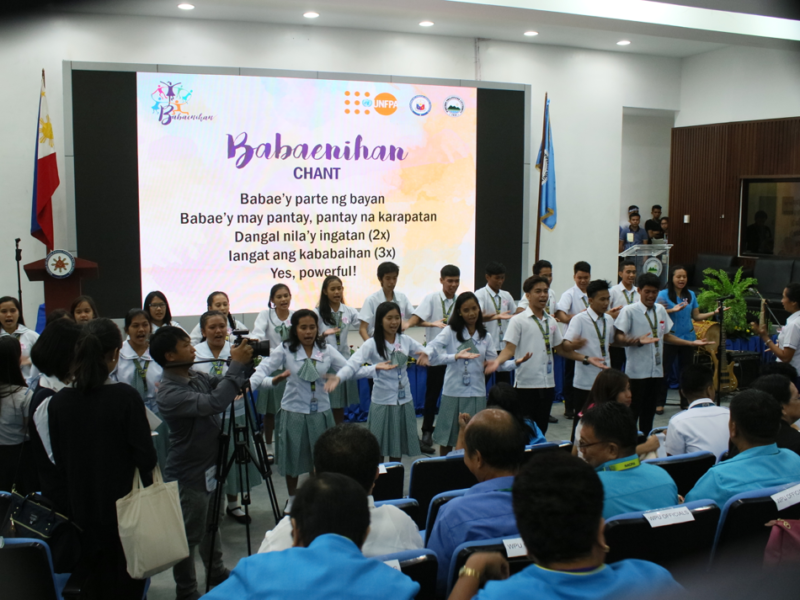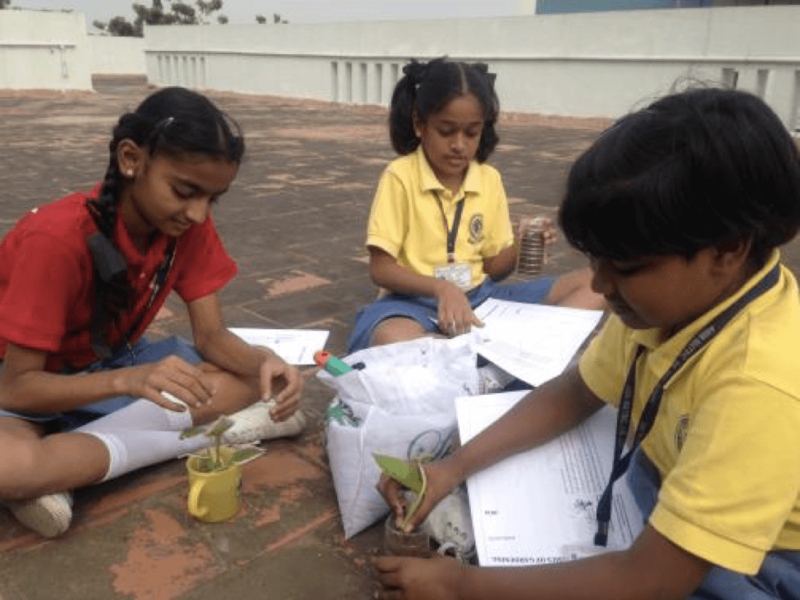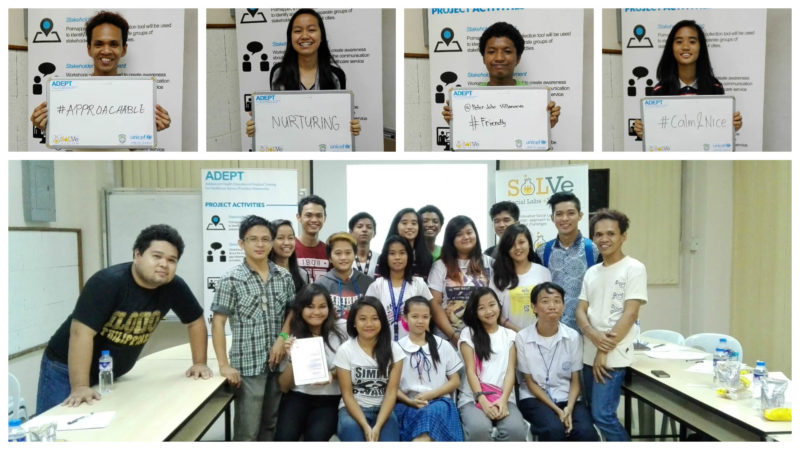
UNFPA launched Babaenihan in 2015, a campaign that aims to raise awareness about the pressing issues that impact on the health and well-being of Filipino women and girls, and how each member of society – from the community to the national government – can contribute to improving their future. It aims to raise awareness on the urgency of addressing teenage pregnancies through investments in education, health, and economic opportunities. The campaign is a partnership between UNFPA, the United Nations Population Fund, and the Office of the Vice President (OVP) of the Philippines based on a mutual goal of empowering Filipino girls in marginalized communities.
ASSIST is providing UNFPA strategic support in producing the campaign’s multimedia requirements including the conceptualization and design of the full campaign strategy and plan, development and production of communications materials, and the execution of the campaign plan. The project also held a nationwide campaign launch and is empowering women through the anti-poverty program of the OVP called Angat Buhay.
India has the largest number of people with uncorrected vision, with over 500 million people needing vision correction, including 42% of the country’s workforce. A factor contributing to this trend is the lack of availability of qualified human resources especially, in rural areas.
Co-financed by DEG and Essilor Private Limited and implemented by ASSIST, Eye Mitra aimed to provide quality vision correction services at affordable prices for underprivileged rural people in India. The project also facilitated successful candidates to set up small businesses on their own to offer vision care services to rural communities at an affordable price. These micro-entrepreneurs were recognized as Eye Mitra Opticians (EMOs). The project also enabled rural households to access vision care and good quality spectacles (for those who need them) at affordable prices. Thus, the rural youth hitherto unemployed will get her / his livelihood through a more respectable self-employment. With the growth in business, she/he would further employ other rural youth at their own store as supporting hands thereby, creating a replication for self-employment generation in rural areas.
With Eye Mitra, five training centers were set up; 350 youth were skilled and 220 Eye Mitras were qualified; 150 Eye Mitra shops were opened sustaining more than 100 new jobs earning USD 600 per month per EMO; and more than 8000 people’s vision was corrected effectively.
Acute shortage of electricity is a major problem that India faces currently. About 71% of electricity is generated from non-renewable resources which results in death from indoor pollution and carbon monoxide burning. However, India simultaneously possesses a huge potential for solar power generation. However, developments in the field of solar energy are met with the challenge of finding people with expertise in the field.
Co-financed by DEG and Phocos, and implemented by ASSIST, ENACT aimed to set up a solar academy to develop skilled technicians from among women and youth of rural areas through a well-structured training program. The larger aim of the project was to take a step towards addressing the problem of acute shortage of electricity in India through renewable energy alternatives.
Over the course of two years, ENACT has created mass awareness among the public on the use of solar energy and its efficiency when compared to other energy sources through various mobilization and awareness campaigns. This project informed more than 800 students in the fields of IT, science and engineering on solar energy and technology. Moreover, ENACT trained 141 students, of which 45 were women, as solar technicians and more than 50 trainers. Dealership was given to several solar technicians who started their own enterprises.
i2Can – Inspiring and Igniting Young Minds is a series of experiential learning programs designed to provide in-school children with a combination of simple life skills and awaken in them the passion for green, clean and safe living. More specifically, the focus is on instilling the right values and skills on health, sanitation and hygiene, first-aid and emergency response, green living philosophy (reduce, reuse, recycle), ethics and morals and problem-solving and decision-making, which would enable the youth to become agents of change.
Through the above initiatives, i2Can aims to empower these young people to learn, practice, and thrive in their communities. They are also actively encouraged to share their knowledge with their immediate family and friends. The key beneficiaries of this programme are the urban poor and rural communities.
ASSIST undertook various activities during the implementation of this project that included teaching using live demonstrations, activity-based learning, workshops, seminars and lectures. By the end of 2017, i2Can had reached over 20,000 students and involved more than 450 schools in the southern state of Tamil Nadu, India.

School gardens serve as living laboratories where academic subjects can be integrated and the children can be active participants in the learning process.
In order to introduce children to such learning, 1,2,3 Grow was an initiative that promoted the creation of gardens at schools in the Indian state of Tamil Nadu. The main aim behind 1,2,3 Grow was for children to gain appreciation and respect for the environment that lasts into adulthood. The initiative also aimed to promote improved social skills amongst school children such as, working in groups and problem-solving; and to prepare them for higher education.
Gardens were built in private schools where children could practice their social skills and learn how to grow plants from which they get healthy food to eat. Workshops were also conducted as a supplementary activity to these pilot gardens.
The agricultural sector of the Philippines comprises 30% of the workforce and about 12 million people. Challenges from resource depletion, social exclusion and lack of access to technology among others, continue to affect the worsening agro-economic trend in the country. Given this, the national roadmap for the cocoa sector has been set to increase production tenfold, providing sustainable incomes for as many as 130,000 Filipino farmers.
Capacitating Cacao Farmers in Mindanao is a project under the DeveloPPP program of the German Federal Ministry for Economic Cooperation and Development (BMZ) in partnership with DEG and Yara Fertilizers Philippines Inc. It is implemented to address cacao farmers’ limited capacity to meet industry demand due to low productivity. This is mainly due to the shortage of viable planting materials and the farmers’ lack of knowledge on crop nutrition, good agricultural practices (GAPs) and post-harvest handling.
The project also aims to increase the efficiency of farmers in cacao production through Yara’s crop nutrition solutions and effective crop handling. Twenty-five local farmers will be trained to become cacao specialists, who will, in turn, provide crop nutrition training to 50 cacao farmers. In addition, model farms will be established and post-harvest processing facilities will be set up in partnership with selected rural-based cooperatives in the area. Through these strategies, the yield of farmers is expected to increase by at least 25 percent and the selling price of the processed beans to increase by at least 10 percent. Eventually, the project will contribute to the country’s achievement of its national target, which is to produce 100,000 MT of dried fermented beans by 2022.

Adolescence is a critical time when the youth are interested in important issues such as reproductive health. However, engaging with them has proved to be a challenge for healthcare workers. ADEPT aims to bridge this communication gap by providing healthcare service providers in four key cities in the Visayas with an e-learning toolkit that they can access at their convenience. The one-year initiative equips healthcare workers to provide the youth with information on reproductive services available for them thus, enabling them to make informed decisions about their health and welfare.
ASSIST developed a video-based e-learning toolkit for healthcare professionals in Borongan, Iloilo, Roxas, and Tacloban. The platforms provided them with relevant healthcare data gathered from the conduct of stakeholder mapping. ADEPT also became a platform for youth groups and adolescent health care providers to interact and access resources on reproductive healthcare.
In developing the toolkit, ASSIST conducted: (1) Stakeholder Mapping to engage groups of key stakeholders in the project sites; (2) Stakeholder Engagement wherein one-day workshops were conducted in each of the cities to build awareness on the importance of adequate communication between healthcare professionals and the youth; (3) e-Learning Tool Design, Production and Launch wherein the development of the toolkit was based on the inputs from stakeholder consultations; and (4) Training of Trainers (ToT) Workshops where healthcare service providers were equipped in the application of the toolkit in their engagement with the youth.
In a bid to extend financial inclusion to remote areas in the Philippines, the CAN program of the Grameen Foundation aims to build a network of financial agents in rural villages of Panay Island. The project enabled sari-sari store owners, mostly stay-at-home mothers, to offer a range of financial services to their villages.
ASSIST developed two interactive, web-based e-learning courses to equip sari-sari store owners to become a financial agent which can be accessed through Android-based tablets. Course One teaches the owners to use the digital payment center device called Ka-Pos!ble!; and Course Two is an engaging, easy-to-understand module on encouraging financial literacy among micro-vendors who used digital payment devices called Digi-tindahan. ASSIST designed and developed the storyboard, script, graphics, animations, and videos for both the following courses.
The Department of Health (DOH), with the support of the World Health Organization – Philippines Country Office (WHO-PHL), led the development of a Manual of Operations for the Adolescent Health and Development Program. The Manual serves as a guide for program managers, coordinators and implementers in operationalizing the National Policy and Strategic Framework on Adolescent Health and Development (AHDP).
To enable the Department of Health to develop an appropriate, effective and sustainable adolescent health and development program, a manual of operations has been developed and ready for print layouts. ASSIST was contracted to provide the layout and design services for this publication. Aside from leading the creative design, ASSIST also reviewed relevant photos and conducted photo shoots to provide the publication with useful visuals,\ and closely coordinated with different DOH units and stakeholders for technical inputs.




